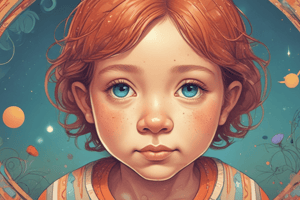Podcast
Questions and Answers
During which year of life do children make significant progress in self-recognition?
During which year of life do children make significant progress in self-recognition?
- Third year
- First year
- Second year (correct)
- Fourth year
Which of the following is NOT one of Erikson's developmental tasks of infancy?
Which of the following is NOT one of Erikson's developmental tasks of infancy?
- Initiative vs. guilt
- Trust vs. mistrust
- Identity vs. role confusion (correct)
- Autonomy vs. shame and doubt
What is the governor of initiative that can lead to both rewards and guilt, lowering self-esteem?
What is the governor of initiative that can lead to both rewards and guilt, lowering self-esteem?
- Perception
- Cognition
- Language
- Conscience (correct)
Flashcards are hidden until you start studying
Study Notes
Development of Self and Emotions in Early Childhood
- Children make significant progress in self-recognition during their second year of life.
- Erikson's developmental tasks of infancy include initiative vs. guilt, trust vs. mistrust, and autonomy vs. shame and doubt.
- Early childhood is a period of development where children use their perceptual, motor, cognitive, and language skills to make things happen.
- The governor of initiative is conscience, which can lead to both rewards and guilt, lowering self-esteem.
- Children in early childhood think that the self can be described by material characteristics such as size, shape, and color.
- Children in early childhood tend to overestimate their attributes to protect themselves from negative self-evaluations.
- Young children's theory of mind includes understanding that other people have emotions and desires.
- Children in early childhood start describing themselves and others in terms of psychological traits.
- Self-conscious emotions such as pride and guilt become more common during early childhood.
- Young children increasingly understand that situations, facial expressions, and behavior can evoke specific emotions.
- The Emotion-Based Prevention program (EBP) is designed to improve young children's understanding of emotions through a teacher-conducted emotions course, emotion tutoring and coaching teacher dialogues, and weekly parent messages.
- Emotional development during early childhood allows children to make sense of other people's emotional reactions and to begin to control their own emotions.
Studying That Suits You
Use AI to generate personalized quizzes and flashcards to suit your learning preferences.




